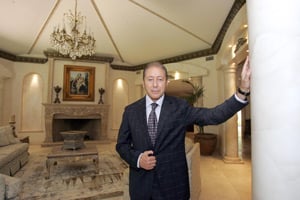
From his 12,000-square-foot home in Beverly Hills, Gennady “Gene” Moshkovitch has been assembling a team of L.A. theme park veterans to develop Magic World Russia on the outskirts of Moscow.
The chief executive of Moschanko Investment Group Inc. is hoping to build a “mini-Orlando” in one of the last remaining frontiers of the theme park industry.
Moshkovitch returned to Beverly Hills last week after two months of pitching investors in Russia in hopes of raising money to launch the $2.5 billion park.
As chief executive of Moschanko Investment Group, also known as MIG 2000, and two other companies, his main business is licensing oil technology from American companies for use in Russia. That means he’s learned the channels between Russian infrastructure and government.
As he tries to develop his first theme park, he’s turned to executives from L.A. design firms and a Hollywood studio.
Early last year, he told a local investment banking friend of his theme park plan. The friend introduced Moshkovitch to Jonathan Zilli, a former executive in the Paramount Pictures licensing division. Zilli, who had left Paramount to consult for retail and restaurant projects, was interested.
Zilli had signed licensing deals for rides such as Star Trek: The Experience in Las Vegas, where he worked with Gary Goddard, chief executive of L.A.-based theme-park design firm Goddard Group. Zilli brought in Goddard as the lead designer for Magic World Russia. Zilli has also signed Tustin-based ProFun/Management as the park’s management company.
Moshkovitch and Zilli said they are in talks with Paramount Studios about licensing characters for rides. Paramount declined to comment on a potential licensing deal.
After he has signed a studio that will allow use of its characters, Moshkovitch said the project will become more attractive to investors. He’s planning for the park’s initial financiers to be Russian, followed by American and other foreign investors by next summer.
“Our merit is through connections, not from revenue,” he said. “Somebody has to put all of this together. That’s our expertise.”
The project has gained some attention in the industry.
“There is definite momentum. They’re moving with their design process,” said Dennis Speigel, a consultant for theme parks and president of Cincinnati-based International Theme Park Services Inc. Speigel isn’t affiliated with the project.
But Speigel said he has been approached to consult on other projects in Moscow about a half-dozen times in the past, and none of the projects gained government approval.
“In a city like Moscow, you better have connections, credibility and money,” he said. “Political ties are absolutely imperative.”
Moshkovitch is banking on relationships that he developed working on oil and gas projects. In the early 1990s, he sponsored the creation of a sister state relationship between California and an oil-producing region of Western Siberia. Since then, he has continued to work with the Russian government agency that oversees land use. Moshkovitch was approached two years ago by the land-use agency about what to do with 600 acres in suburban Moscow. That’s when he started planning the theme park.
“It’s different so far because Gene has been able to get approvals from high-level government agencies,” Goddard said.
Moshkovitch, who has a Ph.D. in systems engineering, first became interested in theme parks in the 1970s.
“When I was a student, Russia became much more open and we saw movies with parks,” he said. “I always thought Russia was missing a park.”
Oil technologies
In 1978, he immigrated to Torrance to work in aerospace. Then in the early ’90s, when Russia opened to private enterprise, Moshkovitch began licensing American oil technologies to refineries there. His three companies that license oil technology bring in revenue of roughly $300,000 a year from licenses and royalties.
Moshkovitch’s plans for Magic World include Paramount-licensed rides, a section for handicapped children, a water park, a retail shopping street and hotels. About 80 percent of the 600 acres would be covered to accommodate weather extremes. MIG 2000 expects 10 million to 12 million visitors per year if the park is able to become operational in four or five years.
But Speigel thinks the Magic World estimates are high. Other international parks, like Happy Land in Long An Province, Vietnam, and Euro Disney in Paris, have had trouble selling tickets.
“It’s very aggressive and very ambitious,” Speigel said. “I don’t think that tourism to Moscow is at the level that would yield that level of attendance. But Moscow has developed in a manner that would allow it to support a major modern theme park. It’s one of the few major metropolitan areas that doesn’t have one.”
